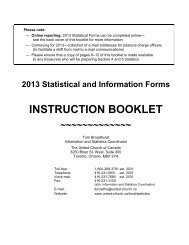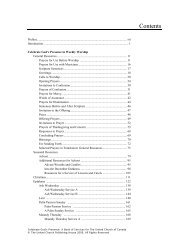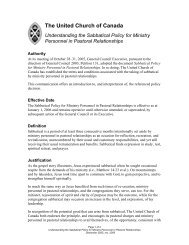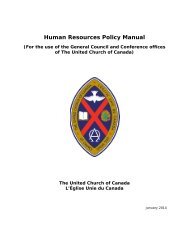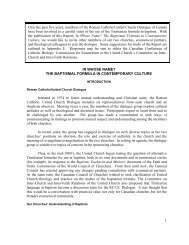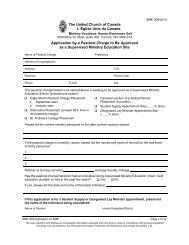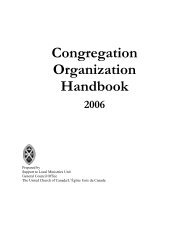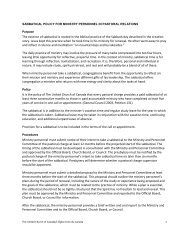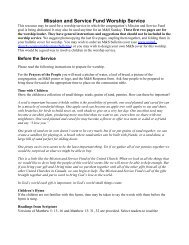Guidelines for Transition Teams - The United Church of Canada
Guidelines for Transition Teams - The United Church of Canada
Guidelines for Transition Teams - The United Church of Canada
You also want an ePaper? Increase the reach of your titles
YUMPU automatically turns print PDFs into web optimized ePapers that Google loves.
What works<br />
To clarify the interim goals, the team might use questions such as these:<br />
• What is this issue really about, and how does it show itself?<br />
• Is there a primary place where this issue originates? How widespread is it?<br />
• Whom does this issue affect, and how?<br />
• Who must be included when seeking solutions?<br />
• What will be different in the congregation’s life if this goal is met?<br />
Clarifying goals will be an ongoing process as the work progresses. Issues will continue to emerge that<br />
relate to the original, overarching goals <strong>of</strong> the interim, and what may seem at first to be a priority may<br />
turn out to be not so important later on. Also, as one presenting problem is discussed, the team may find<br />
that similar patterns become apparent in other, seemingly unrelated situations, and that its focus must<br />
shift. Still, no matter what detours beckon, it is important that the team not get lost in the minutiae <strong>of</strong><br />
goals within goals. <strong>The</strong> overall purposes <strong>for</strong> the interim period must guide the team.<br />
It should also be remembered that not everything that emerges can be resolved by the Interim<br />
Ministry itself. Change takes time, especially in an institution like the church that holds such personally<br />
significant experiences <strong>for</strong> people. Two years is really a very short time in the life <strong>of</strong> a congregation. <strong>The</strong><br />
work <strong>of</strong> trans<strong>for</strong>mation must become an ongoing part <strong>of</strong> church life—something built into the very<br />
fabric <strong>of</strong> its ministry.<br />
<strong>The</strong> <strong>Transition</strong> Team should keep its focus on helping the congregation develop an objective, witnessing<br />
view <strong>of</strong> its life that facilitates identifying unhelpful habits and practices and replacing them with<br />
healthier, more life-giving ones. <strong>The</strong> team should focus on helping the congregation understand how it<br />
limits its vision and practices, and then support the process <strong>of</strong> trans<strong>for</strong>ming what is limiting and shortsighted<br />
into something broader and more functional.<br />
Manage Time<br />
Interim Ministry is time-limited. No sooner is everything in place than team members and the<br />
minister find themselves working against deadlines. For most <strong>Transition</strong> <strong>Teams</strong>, time passes all too<br />
quickly.<br />
A tentative timeline should be created as early in the process as possible in order to guide how the<br />
interim work will unfold. <strong>The</strong> plan must fit into the regular life <strong>of</strong> the congregation, and take into<br />
account factors such as the rhythm <strong>of</strong> congregational life (e.g., periods <strong>of</strong> low attendance, sacred<br />
seasons and observances, the minister’s holidays) and the amount <strong>of</strong> time the Interim Minister must<br />
give to the usual responsibilities <strong>of</strong> being minister.<br />
<strong>Guidelines</strong> <strong>for</strong> <strong>Transition</strong> <strong>Teams</strong> 19



